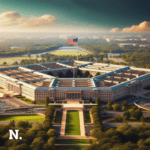Tensions between Israel and Hezbollah have reached a critical point, with the potential for an Israeli military offensive into Lebanon looming on the horizon. This escalation threatens to draw in regional powers, particularly Iran, and could have far-reaching consequences for stability in the Middle East. The United States is actively engaged in diplomatic efforts to prevent a broader conflict, but the situation remains precarious.
Israeli Military Threats
Israeli leaders have made it clear that if Hezbollah does not withdraw from the border, they will launch a military campaign into Lebanon.Recently, Israel’s military validated and approved plans for such an operation. Thus highlighting the seriousness of their threats. This move comes amidst ongoing cross-border skirmishes that have persisted for months, risking a full-blown war.
US officials are working tirelessly to mediate and deescalate the conflict. Amos Hochstein, a senior adviser to President Joe Biden, recently met with officials in both Lebanon and Israel to discuss potential diplomatic solutions. Hochstein emphasized the urgency of finding a peaceful resolution to prevent a larger war, describing the situation as “very serious.”
Concerns Over Iranian Involvement
Air Force Gen. CQ Brown, chairman of the Joint Chiefs of Staff, has voiced significant concerns about the potential for an Iranian response if Israel proceeds with an offensive in Lebanon. Brown noted that while Iran supports Hamas, it would provide even greater backing to Hezbollah. Especially if the group appears to be under significant threat. An Iranian intervention could trigger a broader war, placing US forces in the region in danger.
Challenges in Defense
Brown also highlighted the difficulties the US would face in assisting Israel against a broader Hezbollah conflict. The challenge lies in Hezbollah’s arsenal of shorter-range rockets. Which are more difficult to intercept compared to the Iranian missiles and drones used in previous conflicts. This concern underscores the complexity of the situation and the limitations of external military support.
Pentagon’s Position
Pentagon officials, including Defense Secretary Lloyd Austin, have expressed their concerns about the potential for a wider conflict. Austin has raised these issues in discussions with Israeli Defense Minister Yoav Gallant. Maj. Gen. Pat Ryder, Pentagon press secretary. He reiterated the importance of restoring calm along the border and pursuing a diplomatic solution to prevent further escalation.
Humanitarian and Regional Implications
A full-scale war between Israel and Hezbollah would have devastating consequences, with mass civilian casualties on both sides. Hezbollah’s rocket arsenal is significantly larger than that of Hamas, which could lead to extensive damage and loss of life. The recent escalation, which saw an Israeli airstrike kill a senior Hezbollah commander and subsequent retaliatory rocket fire from Hezbollah. This has already resulted in over 400 deaths in Lebanon, including 70 civilians, and 26 fatalities in Israel, comprising both soldiers and civilians.
The potential for a broader conflict is heightened by the involvement of other Iran-backed militant groups in the region. Hezbollah leader Hassan Nasrallah has stated that militants from Iran, Iraq, Syria, Yemen, and other countries are prepared to join the fight if needed. This mobilisation could lead to an all-out regional war, further destabilising the Middle East.
Conclusion
The current tensions between Israel and Hezbollah are a critical flashpoint with the potential to escalate into a broader regional conflict. While US diplomatic efforts continue, the situation remains highly volatile. The international community is closely watching as leaders strive to prevent a catastrophe. That could have far-reaching consequences for peace and stability in the region. The need for a diplomatic solution is urgent, as the cost of war would be devastating for all parties involved.





